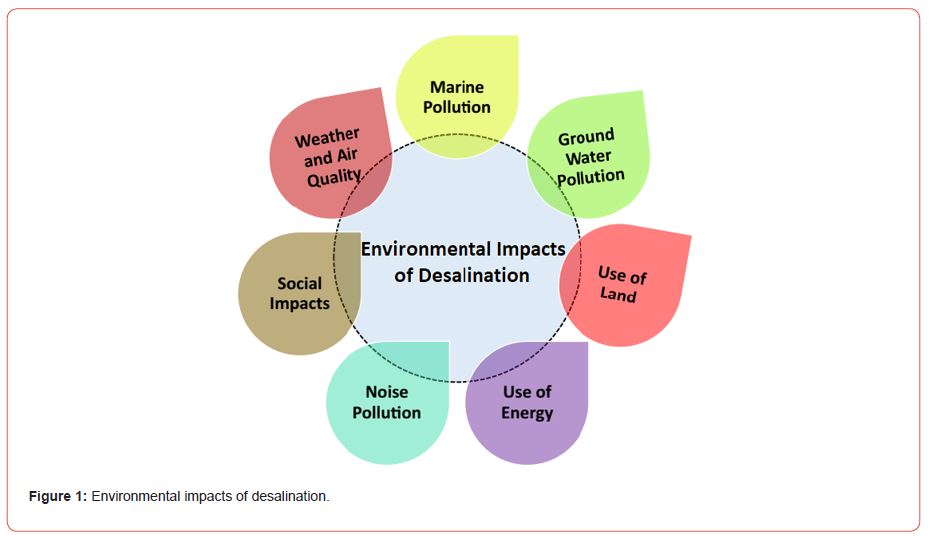Authored by Zakaria Triki*,
Abstract
The desalination of seawater is widely recognized as a highly viable solution to address the increasing demand for freshwater. Despite the significant advantages in terms of economics, society, and public health that desalination offers, there are concerns regarding its possible negative effects on the environment. This study aims to comprehensively evaluate the potential environmental impacts of seawater desalination and explore the possibilities of more sustainable desalination methods. The study systematically examines the environmental effects of desalination on the marine ecosystem, land, groundwater, and air quality. Furthermore, it seeks to critically analyze the actual occurrence of these alleged impacts by referencing evidence from real desalination plants.
Keywords:Desalination, Environmental impacts, Marine ecosystems, Brine discharge and management, Greenhouse gas emissions,
Introduction
The process of desalination requires a significant amount of energy to convert seawater into freshwater and discharge the resulting brine back into the sea. As desalination activities increase globally and larger facilities are built, there is a growing need to assess the potential adverse environmental effects of this process [1–7] (Figure 1) provides an overview of the expected negative impacts on the environment that have been reported in the existing literature regarding desalination plants.
The primary environmental issues related to desalination can be divided into direct and indirect impacts. Direct impacts mainly pertain to pollution caused by brine discharge, emissions of air pollutants like greenhouse gases, and increased energy consumption. Indirect impacts encompass factors such as noise pollution, land use, and construction-related effects. Existing research presents a range of environmental impacts, with some studies indicating minimal consequences while others highlight more significant effects. However, only a limited number of studies offer quantitative data and comprehensive information on these potential impacts. Additionally, some studies have reported insignificant effects of desalination effluents on marine organisms [8-10].

Environmental Impacts of Desalination
Desalination has several environmental impacts that need to be considered. The main environmental concerns associated with desalination are:
Energy consumption
Desalination requires a significant amount of energy, usually from fossil fuel-based power plants or electricity grids. This leads to greenhouse gas emissions and contributes to climate change.
Marine ecosystem disruption
Intake and discharge of seawater during the desalination process can harm marine life. The intake of water can trap or kill marine organisms, while the discharge of highly concentrated brine back into the ocean can create localized areas of high salinity, affecting marine ecosystems.
Chemical use and pollution
Desalination plants often use chemicals such as chlorine to disinfect water and prevent biological fouling. If not properly managed, the release of these chemicals into the environment can harm aquatic life.
Intake of marine organisms
Desalination facilities can inadvertently draw in and harm small marine organisms, including fish larvae and plankton, which are important for the overall marine food chain.
Carbon footprint
As mentioned earlier, the high energy requirements of desalination result in increased carbon emissions, contributing to climate change and its associated impacts.
Brine disposal
The brine concentrate produced as a byproduct of desalination is typically discharged back into the ocean. If not properly diluted and dispersed, the brine can harm marine life due to its high salinity and altered chemical composition.
Habitat destruction
The construction of desalination plants may require clearing land, altering coastal ecosystems, and disrupting natural habitats.
To mitigate these environmental impacts, research and development efforts are focused on developing more energyefficient desalination technologies, implementing better intake and discharge systems to minimize harm to marine life, exploring alternative sources of renewable energy, and improving brine management and disposal methods.
Conclusion
Desalination plays a significant role in addressing water scarcity in various parts of the world. Nevertheless, there has been ongoing debate surrounding the environmental concerns and opposing viewpoints associated with desalination. Our aim was to conduct a thorough evaluation of the environmental effects of seawater desalination and explore the potential for more sustainable desalination methods. Additionally, we discuss measures to mitigate the negative environmental impacts of desalination and examine technologies for the safe disposal of brine concentrate. It is evident that current seawater desalination practices have certain moderate and minor detrimental effects on the marine environment, air quality, and society.
To read more about this article...Open access Journal of Ecology & Environment Sciences
To know more about our Journals...Iris Publishers
To know about Open Access Publishers





No comments:
Post a Comment